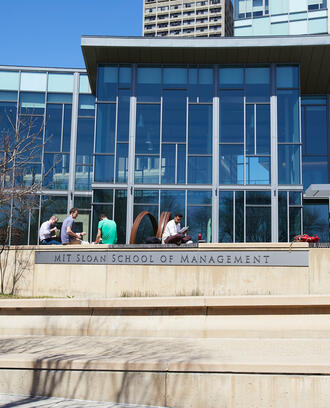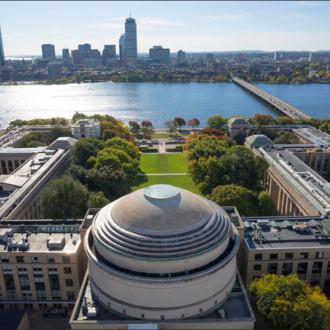Prashant Tibrewal, SFMBA '21
Prashant Tibrewal is an “edupreneur” with more than 13 years of experience. Three years ago, he identified a few niche areas in international education and launched two ed-tech products. To scale his ventures globally, Prashant realized that he needed to hone his skills and network in the areas of leadership, entrepreneurship, and futuristic innovation. When he decided to pursue an executive MBA, his first choice was the MIT Sloan Fellows MBA (SFMBA) program—a full-time, one-year program designed for mid-career, high-potential leaders and entrepreneurs.
You’ve developed two successful ventures and launched two more recently. What were your goals at the start of the SFMBA program?
When I first arrived on the MIT Sloan campus, I had three specific goals: to incubate and validate my venture ideas; enhance my knowledge and skills in scaling business ventures; and connect with accomplished and globally oriented peers who would become a lifelong asset to me. After my first two semesters, I felt like I had already accomplished my goals to a significant extent.
Given your entrepreneurial background, what three activities did you find most valuable?
It’s difficult to choose just three! For me, the most exciting activities would be participating in the innovation and entrepreneurship ecosystem at MIT, the Sandbox Innovation Fund Program, and the New Enterprises course with Bill Aulet. From listening to the pitches of my fellow Sloanies to recruiting MIT interns for my project at Sandbox to collaborating with PhD students working in the field of machine learning—every day I’m learning so much and building my venture block by block. The solid foundation and broad perspective I’m building in the course of the program, will be my biggest takeaway.
How do you decide which electives to take?
With the range of electives that are offered at MIT, plus the opportunity to cross register at Harvard, one is always spoilt for choices. With the high experience that the SFMBA participants have, they come with a good vision of the knowledge and skills that are essential to their growth. I know of peers who are focusing on electives related to Private Equity or Finance, while there are others who are deep diving into Analytics. My focus has been on Entrepreneurship, given my plans to further grow my ventures.
Entrepreneurship is so multidimensional that it requires you to have a good understanding of multiple business functions. In addition to picking courses that focus on Leadership and Entrepreneurship, my strategy for picking electives has been to also leave myself with enough time to take advantage of the experiential opportunities at MIT. For example, I worked on my business idea with Sandbox during the fall and extended my association with Sandbox through the spring, receiving additional funding to develop my idea further.
My SFMBA program advisors have played a big role in helping me plan my electives. I’ve been able to meet with them in less than 24 hours of my request and often on the same day. Their expertise and insights have enabled me to choose my electives with greater confidence and success.
Has there been a class or professor that really stood out to you?
Everyone here is master of their subject area, but I enjoyed the classes of Bala Dharan a lot, especially because Financial Accounting is something I’ve not been very good at—and he made it so simple and enjoyable. For the spring term, I’m looking forward to Scaling Entrepreneurial Ventures taught by Brian Halligan, the Founder and CEO of HubSpot, and Social Media Management, taught by Ben Shields, former Director of Social Media and Marketing at ESPN.
In what ways has the Career Development Office (CDO) helped you expand your knowledge and network?
The CDO is an extremely valuable resource at MIT. It’s been so easy and convenient to work with the advisors there. I’ve had the opportunity to meet so many industry professionals who are happy to get on a call anytime and guide me to the right resources. During one-on-one sessions, my advisors have helped me refine my entrepreneurial plans and gain a clearer picture of the kind of network I should build within and outside the MIT ecosystem. Through these meetings, I’ve gained a lot of confidence in how I’m planning my career and choosing my electives.
How is your family settling in now that they’re here on campus? Have they been able to participate in the MIT community?
The SFMBA program has a strong community of significant others (SO), and the school constantly ensures that they are engaged and integrated into the program. Ever since we landed here, the SO community has been very welcoming. Almost every weekend, the SOs organize meet-ups and events, creating multiple opportunities for spouses and kids to know each other. There are several programs hosted by the program office, which invite participation of the families. It’s turning out to be an extremely enriching experience for my wife—and my 5-year-old son has equally enjoyed the experience.
What has surprised you most about your SFMBA experience thus far?
I’m amazed at how approachable each person in the SFMBA program office has been. Even with an “out of office” response enabled, I’ve had my emails answered within a few hours. What’s also surprised me is how accomplished and how truly humble the SFMBA cohort is. In a class of about 100, each individual is handpicked, but the spirit of “No Fellow Left Behind” is so strong during each interaction and collaboration that it goes beyond the standard social dynamic.
Further, the ease with which I have been able to collaborate with students across the MIT ecosystem, the accessibility and eagerness of the professors to help and advise beyond the curriculum, and the range of electives that open up for cross-registration across the different programs at Harvard, are some of the other highlights of my experience.
I think the biggest surprise has been my change of perspective, especially in how I’m redefining my possibilities and capturing new opportunities.
What advice would you give prospective students who are mid-career and considering whether the SFMBA program is the right move?
There are two levels of advice I’d give to applicants:
While applying to the program: Even with so much experience behind you, it can be overwhelming. It’s easy to lose sight of what your key strengths are. Ask yourself how your peers would benefit from you being in the class.
While pursuing the program: There’s so much to gain at Sloan—and at MIT—so it’s super important to know how you want to benefit from being here. Doing your homework and the right research well in advance can help you tap into so many incredible opportunities. Overall, if you want to give yourself a year to transform your perspective about life and your own future plans, develop an innovation-oriented mindset, and manifest your potential to the highest order, there’s no better place on earth for innovation and opportunity than MIT Sloan.



